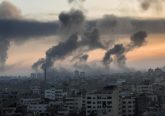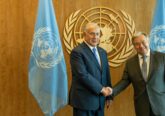Peacekeeping is at the centre of the UN’s efforts to maintain international peace and security. Today, more than 100,000 soldiers and police from 125 countries are serving as blue-helmeted UN peacekeepers around the world. These soldiers and police are endeavouring to keep the peace within, or between, more than 20 conflict-affected states and territories.
How effective are UN peacekeeping efforts? There have been spectacular failures (Rwanda) and notable successes (El Salvador) but how great is the contribution of UN peacekeeping overall? Scholars are divided on this question. Virginia Page Fortna’s seminal work on the impact of UN peacekeeping operations (UNPKOs) suggests that the presence of UNPKOs significantly improves the chances of peace surviving following the cessation of hostilities. In the post-Cold War period (to 1999), she observes, UNPKOs have reduced the risk of peace breaking down by about 50 percent. Further evidence of the importance of UNPKOs in reducing the risk of renewed war is found by other scholars.
Barbara Walter, another leading expert, finds little evidence that peacekeeping increases the duration of the peace. Walter observes that armed conflicts that end with a peace agreement and include good government accountability measures (i.e., participation, written constitution, free press, and rule of law) are more likely to contribute to the durability of peace. As with Fortna, her findings are supported by the work of other scholars.
Recent analysis by Anke Hoeffler and myself has found evidence in support of a middle position.[1] We looked at all armed conflicts that ended between 1990 and 2013. Using conventional definitions of terms—a conflict being defined by a minimum of 25 battle-related deaths per year—we found that after 12 years, peace had broken down in half of all cases. So, what accounts for the survival of peace in the other cases, and does UN peacekeeping play a role?
We know from previous research that the nature of the outcome of an armed conflict has implications for the durability of peace. Violent conflicts that end by military victory tend to produce a more durable peace than conflicts that end by a negotiated settlement. That’s because military victories tend to be more decisive, resulting in the defeat of one side or the other, while negotiated settlements allow warring parties to take up arms again if they choose to walk away from peace.
In our study, we find little evidence that the presence of UNPKOs has a stabilising effect on peace overall. However, we find that UNPKOs have a positive effect on peace duration when the conflict ends in a settlement. Why might UNPKOs matter in relation to a political settlement?
One possible explanation for the peace stabilising effect of a UNPKO after a settlement could be that the UN is instrumental in settling the conflict. In our study, we restrict our analysis to the post-conflict period, but most UNPKOs in the period under review were deployed before the armed conflict ended. Out of the 33 UNPKOs that we include in our analysis, 20 started before the end of the armed conflict. Research by Håvard Hegre and colleagues suggests that UNPKOs may have a stabilising effect by depressing violence: they seem to ensure that minor conflicts do not scale up into major conflicts, on the one hand, and that the transition from minor conflicts to peace becomes more likely, on the other hand. This indicates that UNPKOs may be less about keeping the peace than preparing for peace. El Salvador provides some evidence in support of this observation: here, where there has been no recurrence of civil war, the UN deployed observers in support of a human rights agreement and before a ceasefire was in place.
There may be other reasons why a UNPKO works in support of peace. For instance, a UNPKO can raise the profile of a conflict-affected country, generating greater regional/international interest in, and support for, peacebuilding there. Much also depends on the precise role the UNPKO performs, which in turn will vary from case to case. UN forces can play an important role in the verification of arms and other agreements, in fostering conditions conducive to the holding of elections, and in creating a secure environment in which civil society can engage, among other positive contributions.
To find out more about the relationship between UNPKOs and their stabilising role in post-conflict situations after a political settlement, it will be instructive to look closely at relevant case studies. As there are only 20 peace episodes that see UNPKOs deployed together with a settlement, it would be possible to conduct a more focused examination of all of them to establish the nature and the extent of any causal links. This is left for future research.
This article was originally published by the EU-CivCap project. EU-CIVCAP aims to provide a comprehensive, comparative and multidisciplinary analysis of the EU’s capabilities in conflict prevention and peacebuilding.
References
[1] Richard Caplan and Anke Hoeffler (2017), ‘Why Peace Endures: An Analysis of Post-Conflict Stabilization’, European Journal of International Security, DOI: https://doi.org/10.1017/eis.2017.2.
[2] Håvard Hegre, Lisa Hultman, and Håvard Mokleiv Nygård (2015), ‘Evaluating the conflict-reducing effect of UN peacekeeping operations’, Working Paper, 15 May [accessed 1 June 2017], available from: http://cega.berkeley.edu/assets/miscellaneous_files/122_-_Hegre_Hultman_Nygard_-_PKO_prediction_2015_-_ABCA.pdf.






